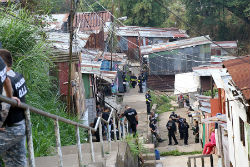Costa Rica’s authorities have arrested over a dozen alleged members of a drug trafficking network that officials say has contributed to rising violence, but the country’s criminal dynamics indicate other local gangs will simply fill the underworld void.
In the early morning hours of April 28, approximately 400 members of Costa Rica’s Judicial Investigations Unit and 200 police officers conducted 27 raids in various parts of the country, resulting in the arrests of 16 suspected drug traffickers, reported crhoy.com. (See video below) The suspects are believed to be part of a drug trafficking group led by Luis Angel Martinez Fajardo, alias “Pollo,” who was captured in Nicaragua in February, according to La Nacion.
Martinez Fajardo’s drug gang is reportedly rivals with the trafficking network led by the Nicaraguan Marco Zamora Solorzano, alias “El Indio,” who is currently serving a 70-year prison sentence for homicide, money laundering, and drug trafficking, reported La Prensa. Territorial disputes between these two groups has reportedly led to over 60 murders in the past three years.

InSight Crime Analysis
Costa Rican authorities hope the dismantling of Martinez Fajardo’s trafficking network will lower violence related to the drug trade, which authorities say account for roughly 40 percent of the country’s homicides. However, the arrests could lead to more violence, as the remnants of the dismantled group fight for control over territory that was previously under a single command.
New trafficking groups will also likely emerge to challenge the old ones, considering the profits to be earned in the domestic drug trade. According to a 2012 report by the Organization of American States (OAS), Costa Rica’s per capita cocaine consumption rate is more than double that of Brazil, the world’s second-largest absolute market for the drug.
SEE ALSO: Coverage of Costa Rica
What’s more, Costa Rica’s apparent growing role in the transnational drug trade will likely continue to spawn home-grown criminal groups. In February, authorities dismantled a drug trafficking ring and an arms trafficking network, both of which operated at the international level. Last year, police arrested 12 Costa Rican nationals accused of shipping Colombian cocaine from the port city of Limon to Belgium.
In some ways, these networks are following their Costa Rican forebears like Alejandro Jimenez Gonzalez, alias “Palidejo.” Palidejo set up a vast Central American network that moved cocaine for Colombia’s fearsome Rastrojos organization through the Isthmus.
When his partner allegedly stole from him, Palidejo sent a hit squad to Guatemala that murdered popular Argentine singer Facundo Cabral instead. Colombian authorities captured Palidejo in March 2012, and sent him to Guatemala to face the murder charges. Nicaraguan authorities later charged Palidejo with helping to run a drug trafficking network that extended from Costa Rica to Mexico. Costa Rica wants to try him for money laundering.

